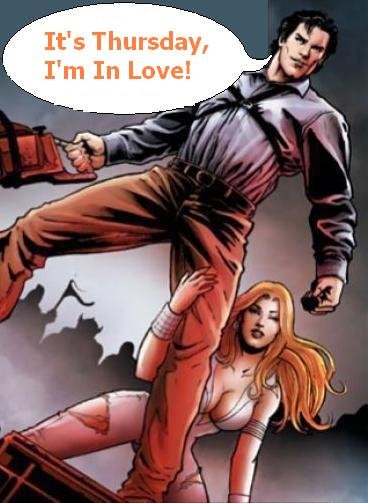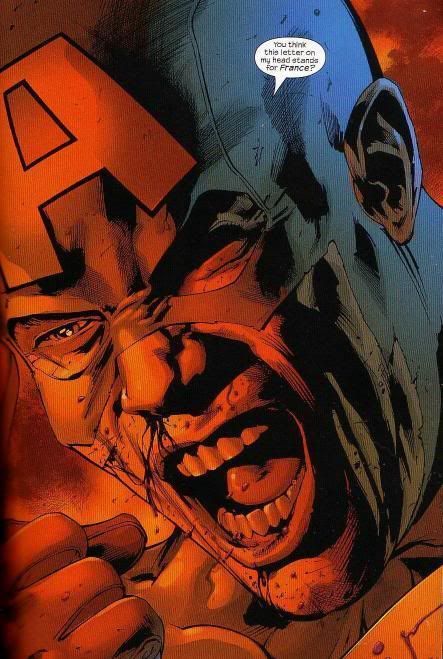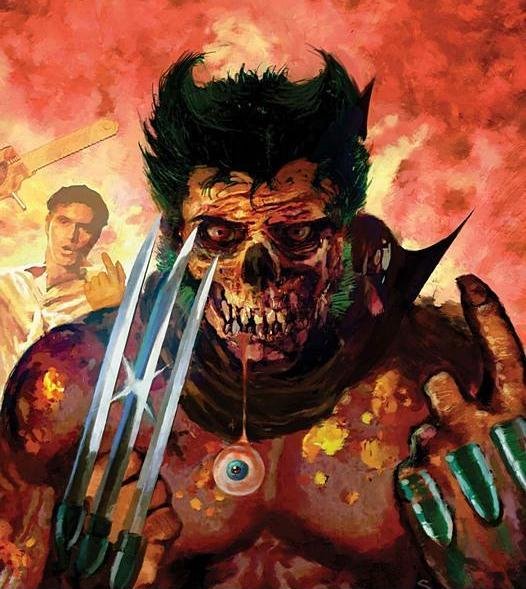ROBERT DOWNEY JR.’S ‘IRON’ WILL
The ‘Iron Man’ star talks about getting in shape when you’re over 40 and working with director Jon Favreau to stay true to their vision
By Rickey Purdin | Posted September 2, 2007 9:05 AM |
Wizard recently visited the set of the highly anticipated “Iron Man” film, which hits theaters May 2, 2008, and will be the first feature out of the gate from fledgling Marvel Studios. In a roundtable interview, star Robert Downey Jr. (“Chaplin,” “Zodiac”) talked about meeting Stan Lee and injecting originality into the superhero-flick genre, and spoke candidly about why he’s ideally suited for the role of Tony Stark.
DOWNEY: Well, first of all he would be in a costume, and so we would probably throw down right there. It’s so funny, because I think that I’m old enough to have a pretty strong aesthetic distance, and I remember the days of “Less Than Zero” or “Chaplin” where I would just throw myself into this tizzy of prep or live the role for 16 hours. The same makeup gal who’s doing this did “Less Than Zero” and put menthol in my eyes and put latex on my lips, and I was doing push-ups before the scenes so that my heart was racing or whatever, and I feel like as much as anything nowadays, we’re not phoning it in—we do really care and we’ve really prepped it into practical oblivion—but I say, “I still try to have some distance.”
So it’s even more narcissistic to be talking to some department head and going, “You know, I don’t think Tony…” which is essentially saying whatever I don’t want to do or want to do in a scene. But if there’s ever been a character in the history of my career that I would be happy to kind of meld with and associate myself with it’s Tony Stark, because it’s the coolest job that I’ve ever had.
I love the history of it and I got to meet Stan Lee. I took him to the Grill in Beverly Hills and I said, “What were the real origins of this, Stan?” He said, “We kind of did it on a dare.” It was whether you could make a billionaire industrialist, hedonistic…I mean, 30 years ago, that was a time when there was a very strong anti-establishment, anti-military industrial complex, anti-rich-over-30 energy. So for him it was just a huge challenge, and he said that they got more female fan mail than all of their other heroes combined because there was this sense of him being very vulnerable and not knowing from day to day whether this very precarious device that keeps him alive and drives him, but is clearly a metaphor for something else—sometimes it’s not a metaphor. You’ve got a small reactor in your chest, which is the reason that you’re not dead and so in the movie, how can that be a metaphor? It’s like saying, “This aqualung underwater, this reed that I’m breathing through….”
Terrence [Howard] told us the story about how they had to relight a scene because one of your improvisations changed the scene. Were there any other times you caused resets like that because of your ideas?
DOWNEY: Well, first of all, as a martial artist you want to be as efficient and effective and use as much linear striking as possible and don’t fight force with force. There are a lot of these concepts where everything is like everything else for film, and so I’m not like coming in and going, “Hey, this is all wrong. Relight.” But I will come in and say, “Given the time that we have, we can probably get this many shots.” Jon [Favreau] has been very flexible and very fun because we’re very similar. I mean, I don’t know how this comes across, but it’s really Jon and I who are creating Tony, and through that, half of the lines are his and half of the ideas are mine and we’ve got all these great people at the top of their fields who are simultaneously exasperated with the fact that we’re betting on an idea. I come in every day and I say, “I’ve seen this in a movie before, no offense. But if we do this, I haven’t seen that.” Some of them are so far out they go, “Will you just go and put on your chest piece and earn a living like everyone else?” But more often than not, I feel the onus and the responsibility to not venture into this genre without an understanding that it’s actually inhabited and enjoyed, and me being amongst these people, by very apt, bright, perceptive people. So, just because it happens to have this two-dimensional aspect to it in its origins doesn’t mean that it doesn’t go deep and that it shouldn’t be an art form. I don’t know. I just think that audiences are continually underestimated, and at the same time I love “CHUD.” I can go see a pretty crappy movie and just love it. If it’s got a couple of things that work, I’m fine. I’m like a soccer coach with kids who probably shouldn’t be playing soccer.
What was going through your mind in having the reporters during the press conference sit on the floor?
DOWNEY: I walked into the room and everyone was standing up and I go, “Here we are.” And after they go [making yelling noises] I was like, “Can’t he come in…?” He’s also supposedly gone through this massive transformation. He’s been humbled and he’s seen things through new eyes and I think that the people he’s interacting with were like, “That’s the press and we do our sound bites and we do our damage control and we do our propaganda and that’s it.” I think that he’s starting to relate to the people as, not an idealist—because I think that he’s too educated in the dark arts of weapons manufacturing and also his family and their legacy to be a moron or suddenly be waving flowers and wanting to join hands and sing “Kumbaya”—but I think that there is an equalization that occurs. Still, that’s a little bit strange. It’s not like he raises his finger and he’s Caesar: “We wear the purple and everyone sit down.” I think that it was just kind of making them nervous and it was just a strange thing to do, and also later on it was like maybe Tony’s gone a little cuckoo, and I thought that’s why he might demonstrate that, even though that’s not why he did it. It’s that thing of miscommunication of intentions and ideas.
DOWNEY: Yes. I love Stan Winston and all the guys on his team. There are several stuntmen as well and Mike Justice and these guys, and again, if Jon and I are Tony Stark, then it’s me and those fellows—my stuntmen and stand-in—who can really wind up being Iron Man, because it’s just such a massive undertaking. At first we said that we wanted to do as much as practically as possible. I came into this going, “Oh, yeah. Practically. Practically.” But it’s really tough and really great. Like, the first time you try on that suit, you could take the least macho superhero man or woman and put them in this suit, and I swear to God that for 15 seconds you would believe that any of them would destroy their nemesis. So it’s really about the long game. It’s about, how do you not have a personality meltdown in like hour seven when you kind of feel like you’ve been tarred and feathered and covered in machine parts?
I had come off doing “Zodiac” before this and “Kiss Kiss Bang Bang,” which was a really good movie that I loved, and “Scanner Darkly” before that—all of these films are really about character and once in a while you get your finger cut off, you have a bad day or you’re wearing an ascot or something like that, and so I had really gotten used to doing these non-technically driven movies. As much as we’ve been able to in this, we’ve tried to have it feel like if Bob Altman had directed “Superman” or something like that.
How long does it take to get into it, and can you not drink water the entire day?
DOWNEY: Right. I’d like to say that I’m the first person who’s been able to relieve themselves while wearing the suit. It was precipitous. Wouldn’t it be great if that was the rest of the interview?
I just want to know how?!
DOWNEY: It was a zipper, but the zipper was still covered by a hitch piece that actually had a groin attached. Suffice it to say, it’s like that thing where you say, “How did that guy escape from jail?” And you go, “He was thin.” “Well, there are a lot of thin people in jail.” “Yeah, but that guy’s head was just the right size and he got out between the bars.”
Like wearing the chest piece, does that ever feel normal or is frustrating sometimes?
DOWNEY: Well, look, wearing a watch can be frustrating if you’re not in the right headspace. Nah, it’s fine.
Can you talk about what your training process has been like?
DOWNEY: For the last five years or so I’ve been doing martial arts, and then when I got the part they asked if I wanted to put on some size. I’m not like 28 or some guy like Daniel Craig who already had meat packed on his shoulders. I mean, you’ve seen me in all the movies. I’m not Mr. Buff Guy and now I’m in the over-40 crew, and so it has literally been this excruciating process of working out so hard and so often just to not look like a little pot-bellied pig. There are a couple of scenes where they light it right and I do all of this stuff, and I’m like, “Wow. That really looks great. I’m really in shape.” Twenty minutes later it goes back down. [Laughs] I’m doing yoga and eating right and sleeping right, and all of the other obvious stuff that is probably more important than just working out.
Then there’s the whole thing of looking at the comic books. We did a photo shoot here the other day that wound up going great, but you see this picture of Tony Stark, who kind of looks like Tom Cruise except more handsome and more buff, and the suit and his hair is blowing in the wind and they go, “Can we get a shot like that?” I was like, “Let’s not go ‘Something About Mary’ here.” I’m like, “I’ve got this.” So it’s been a lot of outside issues: “How do you look in the suit?” And you’re tired and I’m not particularly tall and I’m surrounded by giants, and I was like, “This is weird.” I’m not walking around like Don Adams, on boards or anything, but there are all these elements of, like, when I see this movie I want to be able to believe that he’s the guy.
DOWNEY: Well, this might sound a little weird, but I’m not drawing on other things for him. It’s like I consider him to be a real entity for the most part. I come into work and there are hundreds of people around, and things are made very easy and available to me. I see $100,000 cars and things and all this stuff, regardless of the amount of dough that I’ve made over the years, I’ve never lived a day—I’ve never lived four seconds like this guy has lived every day. So it’s been this really kind of amazing experience to see what it would be like if you had unimaginable resources and you had this change of heart and then you decided to pull those resources into something that became very much like a fetish and obsession, but obsessive in a way that you kind of have to figure out as you go along what the moral psychology is of that.
So I think that it’s a very human journey. To continue not answering your question, I tended to go more into mythology and the real basis of mythology and how men and women are capable of, at a certain sort of level, God making—making themselves godlike, clearing themselves of these earthly things and locking into a purpose or some sort of divine idea, whether it seems dark at the time or not. It’s like you can see through perception and then you have this heroic experience. I could say that about single mothers. I could say that about a variety of different types of folks that I’ve known growing up.
I’m sorry to ask this question, but it’s the natural progression of the character…
DOWNEY: It’s funny that you’re sitting dead center and this is the last question.
And I hope that you’re not offended by my asking it…
DOWNEY: Yeah, yeah, give me all the f---ing preambles. Just bring it, dude.
How much of [your struggle with addiction] has anything to do with what you’re doing with this role, or is it irrelevant?
DOWNEY: Right. Well, I mean, I think that when someone has had a fundamental change and they’re not just trying to backpedal and make it seem like, “I’m going to rehab again. Everything is fine. I’m fine, but I’m still clubbing tonight.” Whatever friends of mine or peers who are just in a different place in their own evolution, by the time that you’ve seen the light, by the time that you get out of Dodge and start doing the right thing, you really don’t relate to the person that historically [they] still say you are. It’s like the thing that guy says, like, “If you Google me all you’re ever going to see is that I’m accused of raping those two kids on the boat.” It’s like, “Why am I Googling you anyway?”
So, my thing is that Tony Stark has been known to go bonkers and be so irresponsible that he’s too hammered to put on the suit. I was like, “Really?” They were like, “Yeah.” I thought all of these times that it felt like it was an atmosphere where maybe there was another one of these because, you know, there’s that whole “you’re the superhero of the week” thing and there are so many, and I was like, “Green Hornet? No.” Or some of the other different ones, some of the other ones that have happened where the first thing is like, “We really want you to play the bad guy in our movie.” It’s the fact that Tony is so conflicted at certain points, I guess, in the later years with “Demon in the Bottle” and all of that stuff. There’s so much stuff going on in this movie as it is that we decided not to do that thing too, but I get it. In a way that’s why it’s ideally suited for me and I’m ideally suited for it.



1 comment:
Keep up the good work.
Post a Comment